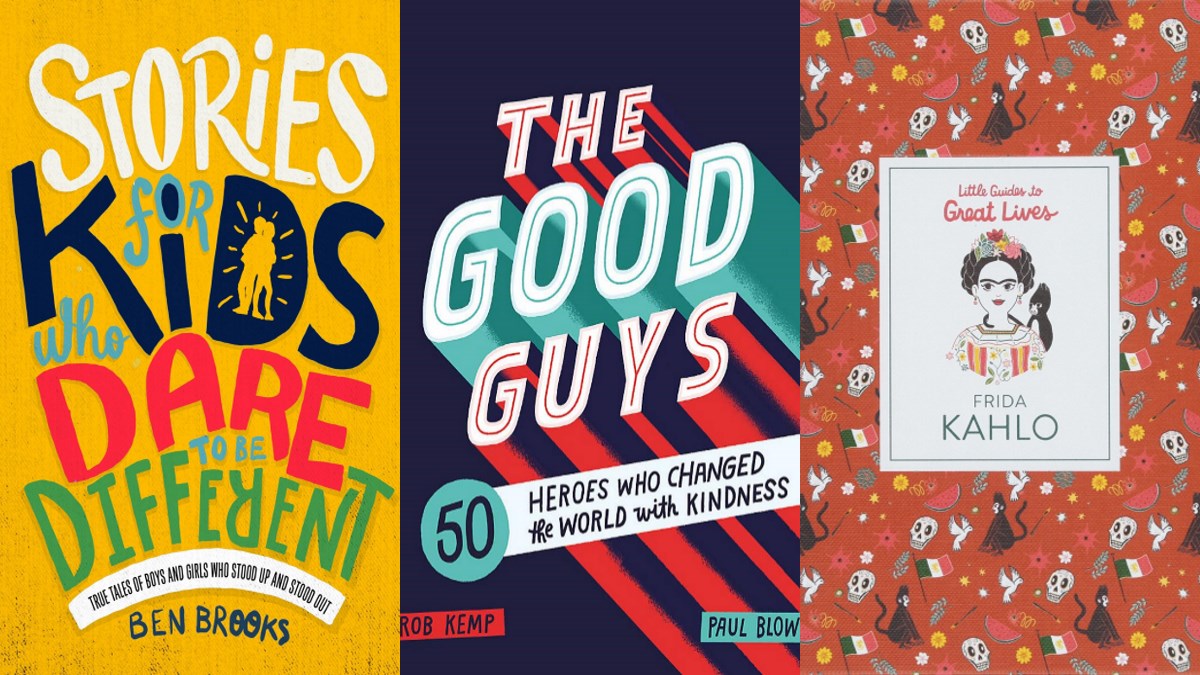 This Week’s Word Is “Biography.”
This Week’s Word Is “Biography.”
With December just around the corner, Word Wednesday inevitably turns its eyes toward present giving. In amongst all the frivolity and games ( hopefully lots of games) of the holiday season, there are always opportunities for quieter more thought-inducing gifts. The ones that your children will set aside when the present is handed over, but will hopefully return to again and again, once the food has all gone and batteries run out. In the stories I read as a child, a gift such as these might have been referred to as “an improving book.”
Thanks to glossy marketing and books like Good Night Stories for Rebel Girls, improving books are much more enticing these days, often with bright colors and letters that are the wrong way around on the covers. There’s a wealth of heroes out there for our children to look up to, and right now, there’s a chest-load of books to help them do it. I’m taking a look at a small subsection of them for “Word Wednesday: Biography.”

What is Stories for Kids Who Dare to Be Different?
A few months ago I reviewed Boys Who Dare to Be Different by Ben Brooks, which was mostly pretty great, but I questioned whether we needed a history book that was just about boys. Clearly, I have some sway over Ben, (perhaps he sees me as a benevolent relative, just like I did with my Uncle Garth) as he’s back with Stories for Kids Who Dare to Be Different, which includes people, male and female, from all over the globe and throughout history.
This is a really great book. Possibly Brooks feels unshackled with his book encompassing anybody who has “dared to be different” or perhaps, writing this second volume, has allowed him to look beyond the more obvious and famous choices. A follow-up book offers little opportunity for critics to say “but what about…?” because they’ve probably been included in the first installment.
For book 2, Ben Brooks has assembled a host of fascinating people you’ve probably never heard of, and if you have heard of them, you’ll learn things you never knew about them. I had no idea for example that the founder of the Girl Scout (Juliet Gordon Low) movement was deafened after a piece of rice ended up in her ear, on her wedding day.
The arrangement of the book is, perhaps, slightly odd. It’s alphabetical by the first name, though Pope Francis comes under ‘P.’ This possibly makes it frustrating to find somebody specific but makes the book brilliant for getting lost in, allowing you to discover the amazing people described between its covers. Brooks also plays a little fast and loose with his term “kids,” but that’s OK too. The stories are still remarkable.
This is a brilliant book for those dreaded homework assignments to find inspirational people. Finding somebody non-obvious can often be a chore, but this book gives a great jumping off point for discovering inspiring people from all walks of life.
You can pick up a copy of Stories for Kids Who Dare to Be Different, here in the US and here, in the UK.
What is The Good Guys?
Following in the same vein is The Good Guys. Subtitled Heroes Who Changed the World with Kindness, the book loses marks before even getting past the contents page for only including men, but let’s set that aside and rate the book on its contents.
“Be kind whenever possible. It is always possible.”
Quote from the Dalai Lama used at the start of The Good Guys
Author Rob Kemp has a simple idea for The Good Guys. In his forward, he talks about wanting to celebrate those who have made a difference to the world with acts of kindness. Often society lauds the tough, powerful, successful, and rich, but it’s possible to make difference whilst being kind too.
The subjects of The Good Guys are generally more famous than those in Kids Who Make a Difference and many of them were famous before their acts of kindness. This is a significant distinction, but it doesn’t lessen the power of the book. Treating others with kindness and respect, and acting with humility, are important skills our children need to learn if we want them to have a positive effect on the world around them. It seems to me, the importance of being kind when in a position of power, is a lesson that’s all too often forgotten.
The book is visually similar to Ben Brooks’ books, with a page of text and a stylised portrait of the subject. Heroes are drawn from history and contemporary society, giving the book a broad appeal. Heroes include Da Vinci, Joans Salk, Nelson Mandela, and Christopher Reeve. Entries for The Good Guys run in chronological order by birth date, giving the book a sense of historical context.
The quality of the prose is good. Once again, each entry is filled with interesting snippets of biographical detail. To be honest, all of these types of book, tend to conform to a standard and The Good Guys is no exception. There’s little to choose between them. Because the subjects of The Good Guys are generally more famous than in Dare to be Different, it is possibly the more useful of the two. That said, you’re probably never going to be short of ways to find information about Martin Luther King or Muhammed Ali, so there’s an argument the more unusual subjects of the Ben Brooks book make it more appealing.
Both books are equally valid, and curiously, perhaps, both have entries for John Boyega.
Whilst I may grumble about Good Guys being mono-gendered, the primary goal of offering kind and compassionate male role models to the next generation is a laudable one and this book does exactly what it sets out to do.
If you want to pick up a copy of Good Guys you can do so here, in the US and here, in the UK.
What are the Little Guides to Great Lives?
There are currently six Little Guides to Great Lives available, with at least two more promised in 2019. These books offer more depth than the “1 page per entry” style of the books outlined above. Obviously, they don’t cover as many people, but they are unbeatable when it comes to introducing younger readers to individual heroes. GeekDad’s Jenny Bristol also wrote about the series, earlier in the year.
I’m a big fan of Laurence King books and these guides are no exception. As ever, they have married engaging book design with a great read, producing potted biographies of some truly inspirational figures. The initial 6 are for Charles Darwin, Marie Curie, Frida Kahlo, Amelia Earhart, Da Vinci, and Nelson Mandela, with Anne Frank and Magellan on the way too.
The books are small but perfectly formed. The text dwells on the ground-breaking and inspirational nature of its subject. At the end of each book is a timeline that details each of the key points in the life of the person in question. There is also a glossary for terms used in the books. One thing I particularly like is, that when a term present in the glossary is referenced in the main text of the book, it’s underlined, so the reader immediately knows they can get help with its definition if they’re unsure what the word means. I feel like this ought to be a standard for all children’s non-fiction.
For longevity and consistency, I think the Little Guides are superior to the 50+ entry biographical almanacs. Admittedly they’re different beasts, but the lives covered in the Little Guide are undeniably great. The additional depth afforded by devoting more pages to each subject makes them more meaningful, especially combined with the excellent design of the books. As more Great Lives are covered, I can see the series building into a formidable and comprehensive library.
If you’d like to check out the Little Guide to Great Lives, you can do so, here in the US and here, in the UK.
So, there you are, that’s Word Wednesday: Biography. The tip of the publishing iceberg that is devoted to great and inspiring lives. If you enjoyed this post, don’t forget to check out my other Word Wednesday reviews, here. Kate Pankhurst’s Fantastic Women books and DKs 100 Scientists Who Made History, may be of particular interest.

Disclosure: I received copies of all the books mentioned for review.







